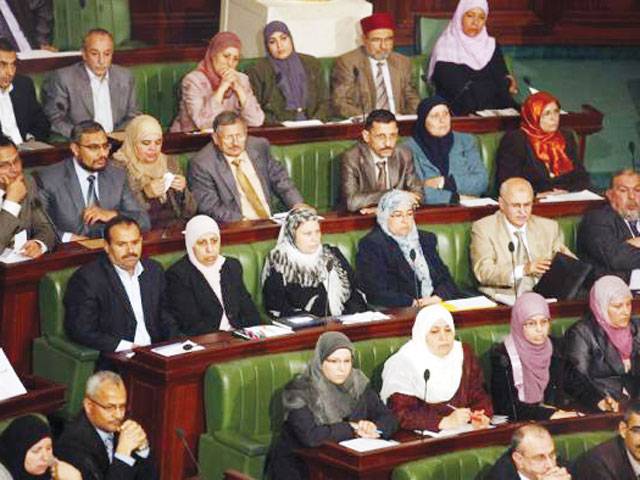TUNIS : Debate on Tunisia's new constitution was suspended Sunday after a deputy claimed he had received death threats because a colleague accused him of being an "enemy of Islam".
The outburst came a day after the National Constituent Assembly (NCA) adopted articles making Islam the state religion but guaranteeing freedom of conscience. Sunday's row broke out after Mongi Rahoui, from the leftwing Popular Front, accused Habib Ellouze of the Islamist ruling party Ennahda of saying he was an enemy of Islam.
Such words are not taken lightly in Tunisia, where the suspected assassination by militant Salafist Muslims last year of two opposition politicians threw the country into a political crisis that has still not been resolved.
A police source told AFP security measures for Rahoui had been stepped up from Saturday night because of the alleged threats.
Addressing Ellouze, a hardline Ennahda member known for his controversial comments, Rahoui asked: "How much more blood must there be before we understand that we are united (under Islam)? "I tell you that I am a Muslim; that my father, my mother, my grandfather and my people are Muslims. "What (Ellouze) said yesterday, that I am an enemy of Islam, has lead to death threats against me."
Ellouze had been quoted by a radio station Saturday as saying Rahoui is "known for his animosity toward religion". He said his words had been misinterpreted and apologised to Rahoui. A number of secular opposition deputies angrily protested that such words could spell the same fate for Rahoui as befell Chokri Belaid and Mohamed Brahmi last year.
Ennahda's detractors accused the moderate Islamist party of failing to rein in the Salafists.
Sunday's session began at 1100 GMT, and was suspended twice. Following the exchange between Rahoui and Ellouze, some deputies demanded that the assembly vote again on an amendment rejected Saturday that would make it a crime to accuse someone of apostacy.
Deliberations were to resume later, with deputies wrapping up the chapter on civil rights. They were then set to move on to discuss forming an electoral commission to oversee elections later this year. Elected in October 2011, the NCA had been due to have drafted and adopted the text within one year.
But its work was delayed by deep divisions between Ennahda and the opposition, aggravated by a rise in Islamist attacks and sometimes violent social unrest. Voting on the constitution comes amid concerns that a January 14 deadline for its adoption may not be met because of repeated disruptions. It was on January 14, 2011, that ousted dictator Zine El Abidine Ben Ali and his family fled the country for exile in Saudi Arabia.
To be adopted, the constitution will need approval by two-thirds of the assembly's 217 members. Otherwise, it will have to be put to a referendum. Prime Minister Ali Larayedh has agreed to resign, handing power to a transitional premier, Mohamed Jomaa, but insists that the constitution and an electoral law be in place first to pave the way for elections.
The powerful UGTT trade union, which has been mediating in the crisis, is insisting that Larayedh step down by Thursday at the latest. Its officials are scheduled to meet Larayedh and Jomaa on Monday.
Saturday, April 20, 2024
Tunisia constitution debate halted after 'death threat'

Policitising Tragedy
April 20, 2024
Tehran to Rafah
April 20, 2024
A New Leaf
April 20, 2024
A Tense Neighbourhood
April 19, 2024
Dubai Underwater
April 19, 2024
Dangers of Deepfakes
April 20, 2024
Feudalism
April 20, 2024
Kite tragedy
April 19, 2024
Discipline dilemma
April 19, 2024
Urgent plea
April 19, 2024
ePaper - Nawaiwaqt
Advertisement
Nawaiwaqt Group | Copyright © 2024





